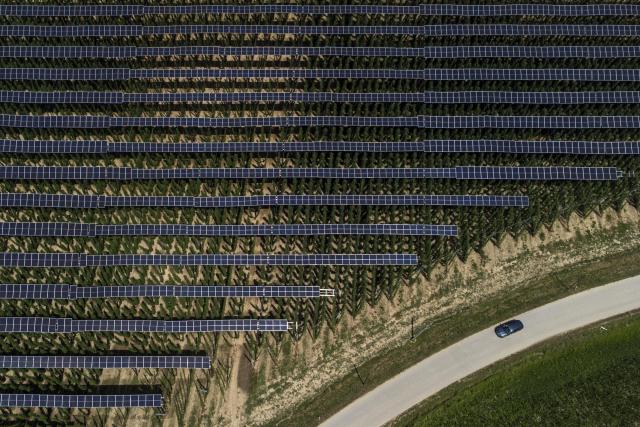Hops for beer flourish under solar panels. They're not the only crop thriving in the shade.

Views (52)

The pilot project — a collaboration between Wimmer and local solar technology company Hallertauer Handelshaus — was set up in the fall of last year. The electricity made at this farm can power around 250 households, and the hops get shade they'll need more often as climate change turbocharges summer heat.
AU in der HALLERTAU, Germany (AP) — Bright green vines snake upwards 20 feet (six meters) toward an umbrella of solar panels at Josef Wimmer’s farm in Bavaria.
He grows hops, used to make beer, and in recent years has also been generating electricity, with solar panels sprawled across 1.3 hectares (32 acres) of his land in the small hop-making town of Au in der Hallertau, an hour north of Munich in southern Germany.
Beer-making hops can suffer if exposed to too much sun, said Bernhard Gruber, who's managing the project's solar component — and since there were already solar installations on the farm, it made sense to give them a second purpose by mounting them on poles above the crops.
In addition to shielding plants from solar stress, the shade could mean “water from precipitation lasts longer, leaving more in the soil” and that “the hops stay healthier and are less susceptible to diseases,” Gruber said. A scientific analysis of the benefits for the plants will be concluded in October.
The farm is working with researchers to understand how to get the balance right, so the hops get enough shade and sunlight for the best harvests each year.
“You can get your renewables from the land that you do have covered and you don’t need to do these massive solar arrays on good agricultural land, which is what you’ve tended to see around to date," said Elinor Thompson, a reader at Greenwich University who’s leading the research.
Thompson, a plant biologist, and her team are working with a fruit farm in Kent in southern England to make sure the plants also get the best out of solar structures.
“Nobody can afford to lose crop, especially in current conditions,” she said. “We are assuming that British summers are going to get hotter, we have a problem with water shortages, we need to be efficient in all parts of agriculture.”
Having shade where it's useful and monitoring the effects of different arrangements of solar panels on a variety of crops will help the world prepare for a more climate-variable future, Thompson said.
Randle-Boggis said the systems can be used for “climate change resilience and a way of improving the growing environment for crops, while also providing low carbon electricity.” He said that some of the crops under the partial shade of solar panels are using around 16% less irrigation.
The solar-covered farms saw increased yields for maize, Swiss chard and beans, and while growers experienced lower yields for onions and sweet peppers, they still had the added benefit of clean electricity generation.
But crop yields can also “vary depending on the weather conditions because we’re seeing the climate changing,” said Randle-Boggis, although he added he was “really surprised and impressed with some of the results that we’re seeing” for solar-covered crops.
“Maize is grown by about 50% of farmers in Tanzania. Maize is also a sun loving plant. So the fact that we had an 11% yield increase in maize ... is a phenomenal result,” he said.
And Randle-Boggis said these projects can continue to be replicated around the world for many different crops, as long as systems are “designed with the local context in mind.”
A future with more crops under solar is Gruber's hope for beer-making hops, too.
“At the end of the year we will set up another solar park over hops,” which will have about 10 times the electricity-generating potential as the current project, Gruber said.
But that's still just the beginning.
“We're getting lots of inquires from hop farmers," he said, "even from abroad.”
___
Beltaji reported from London.
___
0 Likes
